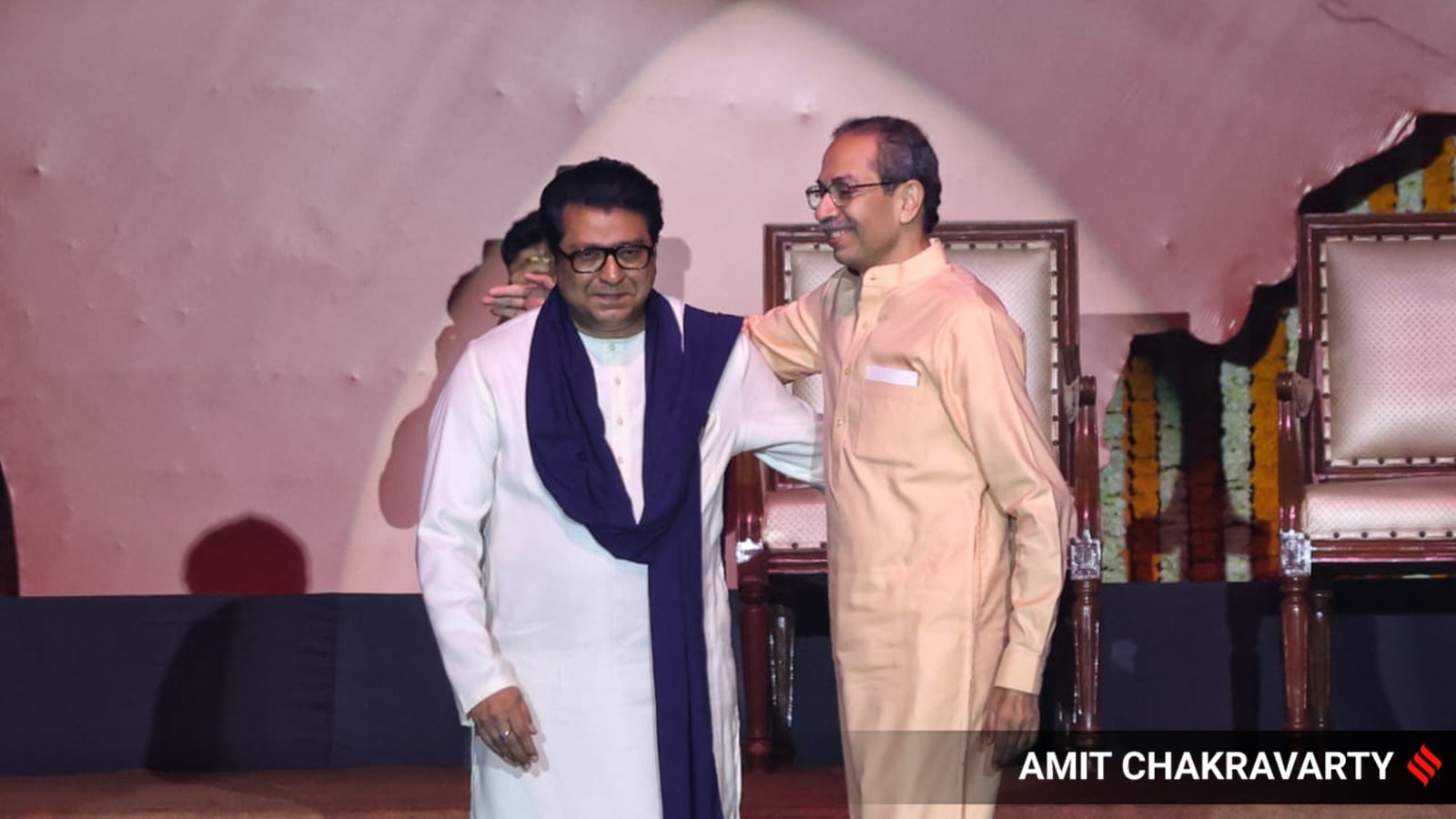 |
|
The political landscape of Maharashtra is witnessing a potentially significant shift with the reunion of estranged cousins Uddhav Thackeray, chief of Shiv Sena (UBT), and Raj Thackeray, head of Maharashtra Navnirman Sena (MNS). Their joint appearance, the first in two decades, has sparked speculation about a possible political alliance, fueled further by their shared criticism of the BJP-led state and central governments. A key trigger for this rapprochement appears to be the now-withdrawn move to introduce Hindi as a third language in primary schools, a decision both parties vehemently opposed, viewing it as an imposition on Marathi identity. The event, deliberately framed as a demonstration of unity for Marathi language and culture, saw both leaders directly target Chief Minister Devendra Fadnavis. Raj Thackeray's remark that Fadnavis achieved what even Balasaheb Thackeray couldn't – reuniting them – underscores the symbolic weight of this occasion. Uddhav Thackeray’s statement hinting at a lasting alliance suggests that this is not merely a fleeting moment of shared opposition, but a potential reshaping of Maharashtra's political dynamics. The decision to come together after years of separation highlights the intensity of their concerns about the perceived erosion of Marathi identity and the growing influence of the BJP. This signals a potential realignment of political forces aimed at challenging the BJP's dominance in the state. The joint rally served as a platform to voice their concerns and rally support for their cause. The implications of this reunion extend beyond the immediate issue of language policy; it represents a broader struggle for political relevance and the preservation of regional identity in the face of national pressures.
The revocation of the Government Resolutions (GRs) mandating Hindi in schools is presented as a victory for the Shiv Sena (UBT) and MNS, demonstrating the power of public opposition and the enduring strength of Marathi sentiment. Raj Thackeray’s scathing attack on the BJP, accusing them of using the three-language formula as a political tool and testing the waters to separate Mumbai from Maharashtra, reveals the deep-seated distrust and animosity towards the ruling party. His assertion that the BJP’s power resides in the legislature and Parliament, while the Thackerays hold power on the streets, highlights the populist appeal and grassroots support that both leaders still command. The underlying narrative is one of a struggle for control over Maharashtra's cultural and political identity, with the BJP accused of attempting to undermine Marathi language and influence to further its own agenda. Raj Thackeray's warning about the BJP's alleged plan to isolate Mumbai from Maharashtra reflects the historical anxieties and regional pride that are central to Marathi politics. His rejection of dialogue with the Agriculture Minister and his insistence on opposing the move through letters underscore his unwavering stance and his commitment to defending Marathi interests. The arguments against the imposition of Hindi are rooted in the belief that it is unnecessary and detrimental to the preservation of regional languages and cultures. The reference to the National Education Policy (NEP) and the observation that southern states do not comply with such mandates further emphasize the resistance to centralized control and the importance of regional autonomy.
Raj Thackeray's questioning of the logic behind the push for Hindi in schools highlights the practical concerns and perceived lack of benefits for Marathi speakers. His observation that Hindi-speaking states are economically backward while non-Hindi-speaking states are forward directly challenges the notion that learning Hindi is essential for economic advancement. The argument that the move is politically motivated, aimed at weakening Marathi and isolating Mumbai, underscores the deep-seated suspicion of the BJP's intentions. The historical reference to the Maratha Empire and its lack of imposition of Marathi further emphasizes the perceived injustice of the current situation. Raj Thackeray's response to criticism about his children's education in English-medium schools highlights the complexities of navigating cultural identity in a globalized world. His assertion that personal education choices do not negate cultural commitment is a defense against accusations of hypocrisy and a reaffirmation of his dedication to Marathi issues. He further bolstered his point by referring to Balasaheb Thackeray and L.K. Advani as examples of leaders who studied in English medium schools yet remained staunch supporters of their respective causes. The criticism from the BJP and Shinde camps is portrayed as a diversionary tactic to deflect attention from the withdrawal of the GR on the three-language formula. Raj Thackeray's concluding warning about future political tactics and his call for unity among Marathi speakers underscore the ongoing struggle for cultural and political dominance.
Uddhav Thackeray’s endorsement of Raj Thackeray’s sentiments and his affirmation of their shared ideology reinforces the significance of their reunion and the potential for a lasting alliance. His emphasis on the unity being about Marathi, not just politics, underscores the importance of cultural identity in their political agenda. Uddhav Thackeray's criticism of Deputy Chief Minister Eknath Shinde for raising the slogan “Jay Gujarat” and his depiction of Shinde as subservient to the BJP further highlight the perceived betrayal of Marathi interests by the ruling alliance. The implication is that the current government in Maharashtra has compromised its commitment to the state's identity and autonomy in favor of aligning with the central government. This provides a stark contrast between the Thackerays, who are positioned as defenders of Marathi identity, and the Shinde-led government, which is accused of prioritizing national interests over regional concerns. The combined effect of Uddhav and Raj Thackeray's speeches and actions is a powerful message of resistance against perceived threats to Marathi language, culture, and political autonomy, potentially reshaping the political landscape of Maharashtra and challenging the dominance of the BJP. The coming together of these two influential leaders, after a long period of estrangement, signifies a potentially significant shift in the state's political dynamics and warrants close observation as the situation develops.
